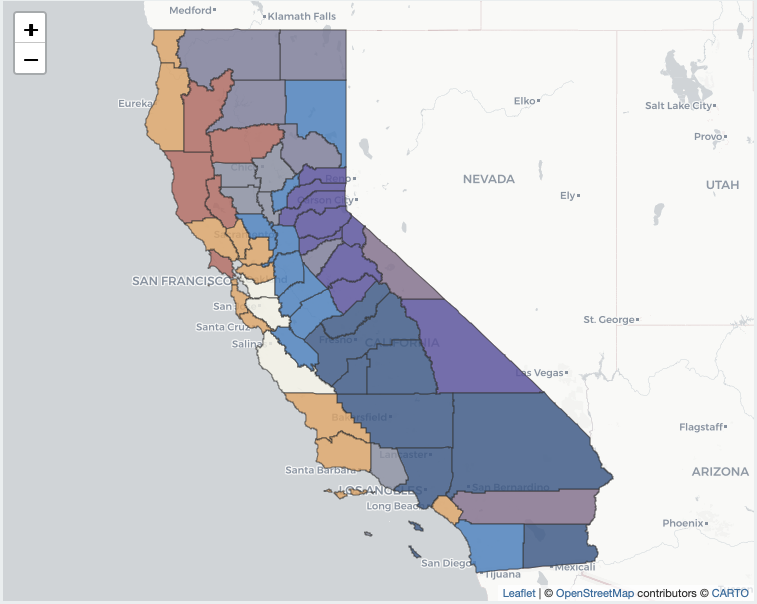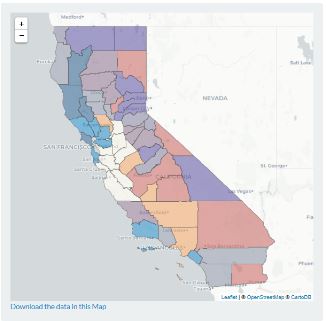Climate change is the significant and lasting change of our climate and weather over sustained periods of time. There is international consensus that human activities over the last 50 years have altered the Earth's natural climate. Excess production of greenhouse gases and changes to our natural ecosystems (such as deforestation) are contributing to global warming.
Key climate change-related issues including extreme heat, poor air quality, and water scarcity are being felt throughout California, although the resulting burdens, including the impacts on human health, across the state's diverse populations is not equal.
Addressing climate change represents a significant opportunity to improve public health and advance health and racial equity.
The Climate Change and Health Equity (CCHE) Branch with California's Department for Public Health (CDPH) embeds health and equity in California climate change policy and planning.
CDPH CCHE recently developed the Climate Change & Health Vulnerability Indicators for California (CCHVIs) and Visualization (CCHVIz) to better understand the people and places in California more susceptible to adverse health impacts associated with climate change.
Climate Change Vulnerability Across California
CCHVIz is the interactive data visualization platform for the Climate Change & Health Vulnerability Indicators for California (CCHVIs).

Climate Change, the Environment, and Health
In California, several groups are particularly vulnerable to the impacts of climate change, including low-income and minority communities, who often lack resources and live in high-risk areas. The elderly, young children, and individuals with pre-existing health conditions are more susceptible to health issues from extreme heat and poor air quality. Farmworkers and outdoor laborers face direct exposure to extreme weather, while the homeless population is at heightened risk due to the lack of adequate shelter.
These groups require targeted support to address their vulnerability and resources to enhance their resilience to climate change.
Air Quality
Climate change and air pollution are closely linked. Air pollution we generate in our daily lives contributes to climate change. The resulting increases in temperature will, in turn, worsen pollution. Air pollution contributes to a number of illnesses, including asthma, heart disease, and stroke. Low-income communities and communities of color in California are especially vulnerable to air pollution.
Wildfires
High temperatures, strong winds, and dry vegetation - all favorable conditions for wildfires - will increase with climate change. As California's climate changes, wildfires are becoming more frequent and severe. Health impacts include death and injury from burns or smoke inhalation, as well as the traumatic stress of experiencing such a disaster.
Extreme Heat
Extreme heat events will become more common in the coming years. By 2100, average daily temperatures are expected to rise 5.6°-8.8° F. Effects from extreme heat can range from mild heat cramps to dehydration to death. Certain populations, such as elderly people living alone, face much greater health risks during heat waves.
Vector-Borne Diseases
Vector-borne diseases (VBD) are infectious diseases that are transmitted to humans by animals, also called "vectors", such as mosquitoes, ticks, and rodents. Climate change can cause vectors or the diseases they carry to spread more rapidly and to new areas, putting people at risk.
Floods, Droughts, and Extreme Weather
As the climate changes, extreme weather events will occur more frequently, including both droughts and floods. These extreme weather events will impact health in many ways. For example, changes in precipitation will alter our food chain, drinking water supplies, and wildfire patterns. Floods can devastate communities and result in drownings, infections, displacement from one's home, and long-lasting mental health effects.
Sea Level Rise
Sea levels will rise in the coming decades as a result of melting of mountain glaciers, ice caps, and ice sheets. Rising sea levels will encroach on land that is home to families, businesses, and communities. A 5-foot increase in sea level would put an estimated half-million Californians at risk of losing their homes to flooding. The most damaging events, however, will occur when storm surges combine with rising seas to inundate coastal areas.
California Climate Adaptation Strategy
Adaptation is the process of adjusting human and natural systems to minimize the harmful impacts of climate change. In 2009, California adopted a Climate Adaptation Strategy (CAS) to summarize risks from climate change and to strategize appropriate adaptations.
The CAS notes that for climate adaptation strategies to minimize negative health effects, there needs to be:
- Increased awareness of potential climate change-related public health impacts.
- Improved surveillance and monitoring of climate risks and related outcomes.
- Maintenance of a robust public health infrastructure.
- Expanded research on the health impacts of climate.
- Healthy, equitable, and resilient communities that can mitigate and respond to climate change and protect vulnerable populations.
Climate Change Resources

Climate Change and Health Vulnerability Indicators for CA
Indicators, data, and narratives to assess exposures, social vulnerability and adaptive capacity

CDPH Climate Change and Health Equity
The CDPH Climate Change and Health Equity (CCHE) Branch embeds health and equity in California climate change policy and planning, and embeds climate change and equity in public health policy and planning.

CDC's Climate and Health Program
CDC’s Climate and Health Program supports state, tribal, local, and territorial public health agencies as they prepare for the health impacts of a changing climate.

U.S. EPA Climate Change Indicators
EPA has developed more than 50 climate change indicators that show changes over time and include more than 100 figures as graphs and maps.

Cal-Adapt
Cal-Adapt provides the public, researchers, government agencies and industry stakeholders with essential data & tools for climate adaptation planning, building resiliency, and fostering community engagement.

PHI Center for Climate Change and Health
PHI’s Center for Climate Change & Health contributes to building healthy and climate-resilient communities that have the right tools to mitigate and adapt to climate change.

The Intergovernmental Panel on Climate Change
The Intergovernmental Panel on Climate Change (IPCC) is the United Nations body for assessing the science related to climate change.

Be Prepared California
Be Prepared provides information on disaster planning and is designed to assist Californians in preparing for catastrophic threats to public health.
